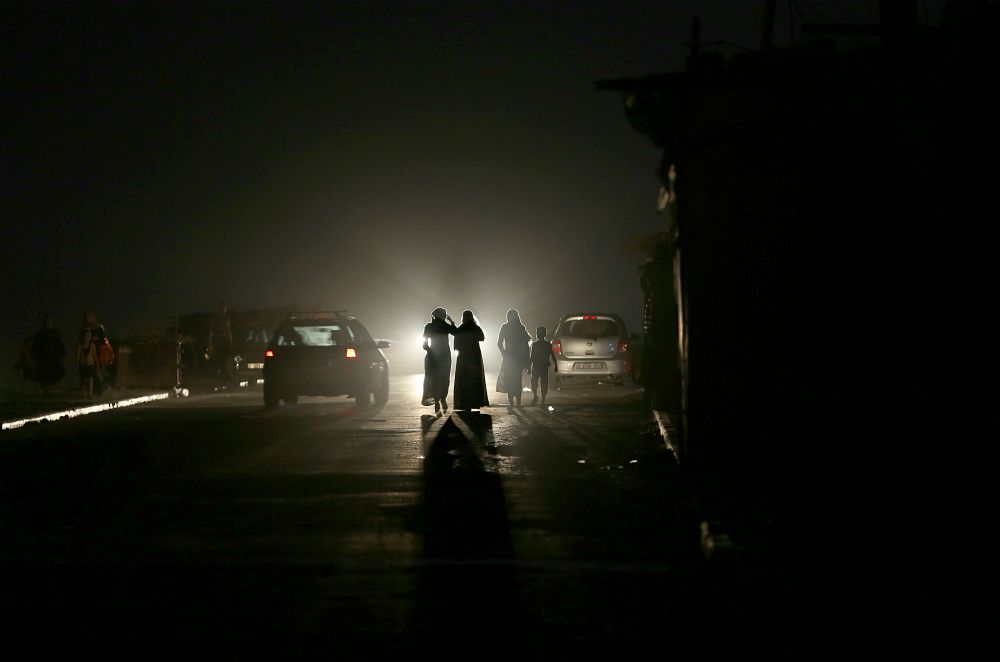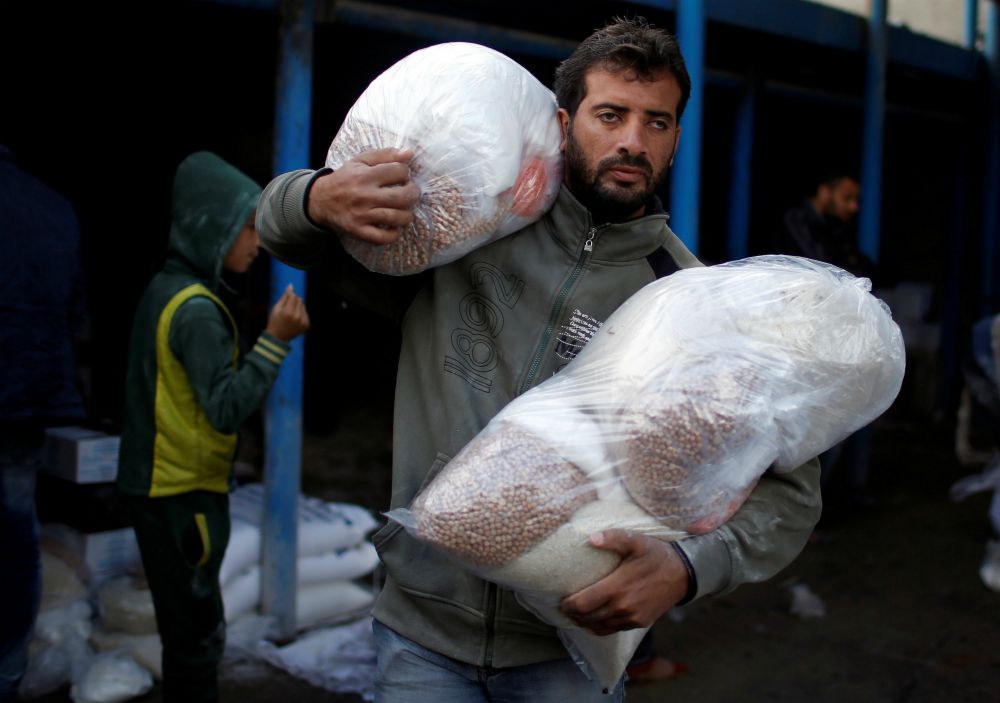
Palestinians walk in a street of the al Shateaa refugee camp during a power outage in Gaza in late June, 2017. (CNS/EPA/Mohammed Saber)
Thirteen years after Israel withdrew its settlers and military from the Gaza Strip, this 140-square-mile narrow patch of land that is one 10th the size of the smallest U.S. state of Rhode Island, is on the verge of a total infrastructural and economic collapse.
Penned into this tiny territory are 1.8 million Palestinians who have endured three crushing major conflicts in 10 years between the Palestinian militant group Hamas and Israel and endured a blockade that has earned Gaza the label of "the world's largest open air prison." These Palestinians live in unbearable conditions of high unemployment, poverty and the increasing lack of even the most basic services for survival.
The statistics are staggering. The World Bank has reported that only 10 percent of Gaza's population has access to safe drinking water due to the breakdown of the sewage system. Wastewater pollutes the aquifer that flows beneath Gaza, contaminating even the fishing grounds off Gaza's coast. Israeli officials have warned of the increased risk of a cholera outbreak.
A major fuel and power crisis has led the U.N. to warn that Gaza's emergency fuel supplies will soon run out unless $6.5 million is provided to buy generator fuel and stave off the collapse of "critical services" such as MRIs, CT scanners and X-ray machines in hospitals. Fuel is also required for the functioning of operating theatres, schools and desalination plants. On February 5, the Palestinian Ministry of Health announced that operations in 16 healthcare centers and hospitals had been suspended due to lack of fuel.
Advertisement
Economic statistics are depressing. According to the World Bank, 44 percent of the population of Gaza is unemployed, including 60 percent of people between the ages of 15 and 29.
No party has its hands clean when it comes to these grim statistics. A variety of actors have cynically manipulated or downplayed the suffering of the Palestinians of Gaza to achieve their political goals.
Following its withdrawal in 2005, Israel imposed a total blockade on Gaza, with draconian restrictions on the flow of goods into the territory and on people out of it, whether to Israel itself or the West Bank, in order to to contain Hamas and also to pressure Gazans to eventually oust the group from power. This blockade even extends to Gaza's coast, preventing Palestinian fishermen from fishing more than 3 miles out. Gaza's resulting inability to trade with its neighbors and its anemic economy are the reasons for its high unemployment rate and a virtually nonexistent tax base.
The blockade extends even to the critically ill. In 2017, Israeli authorities approved less than half the permit requests it received for medical appointments in hospitals across the occupied territories and Israel — the lowest level since 2008. According to the World Health Organization, this denial or delay in permits has resulted in the deaths of 54 Palestinians, prompting four Israeli and Palestinian human rights groups to stress the need to end the Israeli blockade.
Israel is not the only country blockading Gaza. To the south, the border with Egypt had provided some limited and restricted relief as Egypt had largely turned a blind eye to the tunnels Hamas had dug under the border with Egypt to smuggle in not only weapons but also vital goods and fuel. However, after the military coup that toppled the elected Muslim Brotherhood president of Egypt in 2013, current Egyptian president Abdel Fattah el-Sisi clamped down on the Gaza border.
Sisi considers Hamas, an offshoot of the Muslim Brotherhood, a threat and consequently applied pressure on Hamas by shutting the main Egyptian border crossing with Gaza for long periods of time. Egypt has used that pressure to force Hamas to close the tunnels and is also banking that the people of Gaza will blame Hamas for their situation and force Hamas to turn over rule of the Gaza Strip to the internationally-recognized Palestinian Authority (PA.)
Shamefully, internal Palestinian divisions, namely an ongoing tense standoff between Hamas and the PA, have most recently contributed to the current crisis. Tensions between Hamas and Fatah (the main political party making up the PA) flared in 2006 when Hamas had beaten Fatah in elections held in the occupied territories. Inability to reach an agreement on power-sharing resulted in a split, with Hamas taking over Gaza in June 2007 after ousting its Fatah rivals from the territory. This split, with Fatah ruling the West Bank and Hamas ruling Gaza, remains today.

A Palestinian carries food supplies at a United Nations food distribution center in the Al-Shati refugee camp in Gaza City Jan. 15. (CNS/Reuters/Mohammed Salem)
In June 2017, the PA upped the pressure on Hamas by reducing the amount of money it pays Israel to supply most of the power to Gaza. Israel consequently reduced power resulting in Gaza households now getting 2-4 hours of power a day. This drastic decrease in power has devastated sewage treatment, water desalination, hospitals and the telecommunications system and resulted in the closure of Gaza's only power plant. The PA has also stopped payments to Egypt for fuel oil which allowed generators to provide some backup.
A deal was almost reached between the Palestinian Authority and Hamas in October 2017 to hand over administrative control of Gaza to the PA, which in turn would have lifted the sanctions. However, finger-pointing and bickering between the two sides over power-sharing has foundered the deal.
Illustrating the complexity of the situation and the maxim that politics makes for strange bedfellows is that, officially, both Israel and the PA have downplayed the severity of the situation. The PA has blamed such news on a misinformation campaign by Hamas, while the Israeli defense minister Israeli foreign minister Avigdor Lieberman has stated that although the economic situation was complicated and had to be addressed, there was "no humanitarian crisis."
Other Israeli officials have disagreed with Israel's decision to let the PA pressure Hamas through squeezing the Palestinian people in Gaza. "I spent years killing Hamas terrorists," says Noam Tibon, a former Israeli major-general. "But you have to give people some hope. When someone is in a corner, he has no choice but to kick out. It's in Israel's interest to support Gaza's economy, not to strangle it. We should be giving them a port, power, water and jobs in Israel."
Israel's army chief of staff, Gen. Gadi Eisenkot, warned that the situation in Gaza is leading to a likely fourth round of conflict with Hamas. He warned the Israeli cabinet on Feb. 4, 2018 that Israel could face another war with Hamas as the inevitable outcome of the harsh economic and humanitarian conditions in Gaza. Eisenkot called for stepping up aid to the Palestinians in Gaza in order to help defuse the situation.
Hamas, too, as the de facto ruler of Gaza, bears its share of responsibility in the deterioration of the Gaza situation since 2007. Its priority should be strictly the people of Gaza and funding social needs such as food, housing or education. Instead, Hamas has also spent untold sums on its military wing. Their delusional military strategy calculates that as long as they can launch attacks on Israel with their homemade rockets and through their tunnels, this is victory in itself. This calculus, along with Israel's massive and disproportionate military response in three major conflicts with Hamas, has resulted in the deaths of thousands of Palestinian civilians.
The final actor in this crisis is the United States. In January 2018, the Trump administration announced that it was withholding $65 million out of the $125 million of planned funding to United Nations Relief and Works Organization (UNRWA) — in other words, to the most helpless actors in the tragedy, the Palestinian refugees. 1.3 million out of the 1.8 million population of Gaza are refugees, of either the 1948 or 1967 wars with Israel. Seventy-seven percent of these refugees live in poverty and rely on UNRWA funds for basics such as food for survival.
U.S. President Donald Trump is withholding the funds because he says the United States gets "no appreciation or respect" from the Palestinians for the funding. Perhaps this is the least surprising of the punitive actions against Gaza, as it is coming from the least informed and knowledgeable U.S. president of modern times regarding world affairs.
Whether the many actors to this conflict will come to their senses before the situation reaches the point of explosion is hard to predict. What is easy to predict is that the current situation is untenable and if left unaddressed an explosion of some sort will happen that will not be confined to the narrow borders of Gaza but will certainly spill over into the region beyond.
[Ra'fat Al-Dajani is a Palestinian-American businessman and political commentator.]








